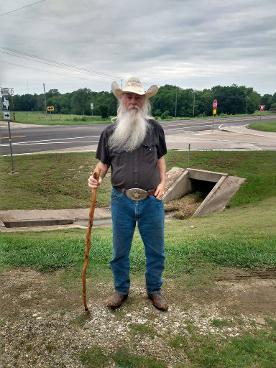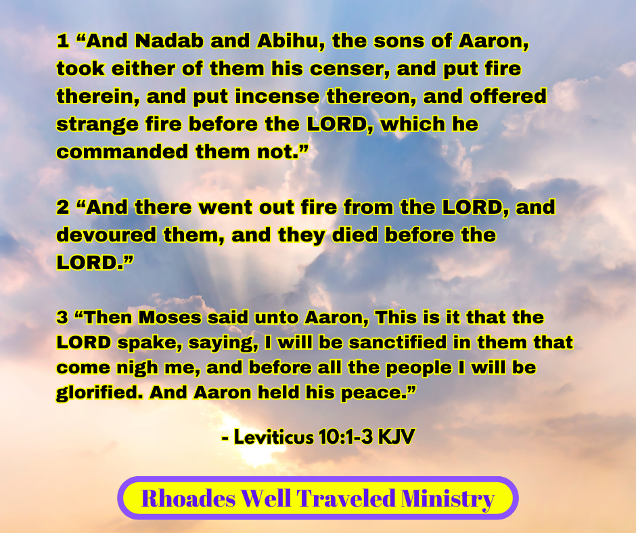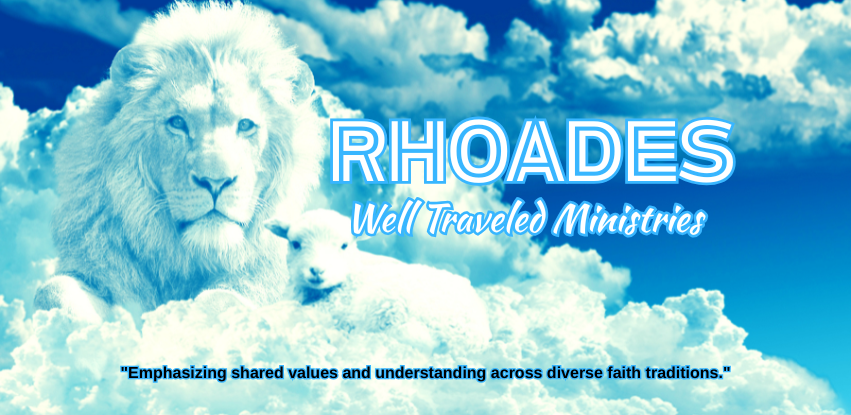GOD'S WORD
▬ Exploring the Mythical World ▬
"Of Cowboys Biblical Times"
February 12, 2024

Reverend Danny Rhoades
When we think of cowboys, images of rugged men riding horses, herding cattle, and living on the open range come to mind. However, did you ever stop to wonder if cowboys existed in biblical times? It's an intriguing thought! In this devotional, I will delve into the myth and reality of cowboys in the Bible, exploring the fascinating world of these unconventional figures of ancient times.
The modern concept of cowboys has been heavily influenced by Western culture, particularly through movies and literature. However, it's essential to remember that the Bible predates the Wild West by thousands of years. While the idea of cowboys as we know them today may not be an accurate representation of biblical times, there were undoubtedly similarities in terms of livestock management and nomadic lifestyles. Let's now uncover the historical context to better understand the reality behind cowboys in the Bible.
To understand the presence of cowboys in the Bible, we need to consider the timeframe and geographical setting. The Bible covers several millennia and a vast range of regions, from the deserts of Egypt to the hills of Judea. These landscapes were home to various nomadic tribes who relied on livestock for survival.
Livestock, such as sheep, goats, and cattle, played a crucial role in ancient societies. Nomadic herders would move their animals across different terrains in search of grazing lands, water sources, and shelter. This lifestyle required skilled individuals who could
In biblical times, livestock held immense value both economically and culturally. They provided essential resources such as meat, milk, and wool. Additionally, livestock served as currency and indicators of wealth. The responsibility of caring for these valuable assets fell upon the shoulders of those who could navigate the challenges of the nomadic lifestyle, the biblical "cowboys."
The nomadic lifestyle came with its own set of challenges. Constantly on the move, herders faced harsh environmental conditions, the risk of theft, and the need to find adequate pastures for their animals. They had to be resourceful, adaptable, and possess a deep understanding of the land to ensure the survival of their herds. These early cowboys were not just caretakers of livestock but also masters of survival in challenging circumstances.
One of the most prominent figures in the Bible, Abraham, showcases the traits of a biblical cowboy. Known as the patriarch, Abraham led his family and herds across various lands, facing countless trials and hardships. His faith, resilience, and skill in managing livestock earned him a place in history as an exemplary figure in the world of biblical cowboys.
Moses, revered as a great leader and prophet, began his journey as a shepherd. He spent years tending flocks in the wilderness, honing his skills as a caretaker and protector. Moses' experiences as a shepherd undoubtedly shaped his leadership abilities, preparing him for the monumental task of leading the Israelites out of Egypt.
Before ascending to the throne as king, David was a shepherd boy who fearlessly defended his flock from predators, even slaying the giant Goliath. David's unique combination of warrior spirit and shepherd's heart exemplifies the qualities that biblical cowboys embodied – bravery, dedication, and a deep love for their livestock.
While cowboys as we envision them in Western culture may not have existed in biblical times, the presence of skilled livestock caretakers and nomadic herders is undeniable. These biblical cowboys played an integral role in society, caring for valuable livestock and facing the challenges of a nomadic lifestyle. As we explore the stories of notable figures like Abraham, Moses, and David, we gain a deeper appreciation for the rich tapestry of the biblical world and the remarkable individuals who thrived within it.
Being a cowboy in biblical times wasn't just about riding around on horses and looking cool. These guys had an important job - herding livestock. Imagine dealing `with unruly animals without the luxury of modern technology or a Taser. Biblical cowboys had to rely on their wits and clever techniques to keep those wayward sheep and cattle in line. Whether it was using dogs to guide the flock or strategically placing themselves to create a barrier, herding was no easy task back then.
Now, we all know that cowboys and horses go together like peanut butter and jelly. But imagine riding a horse without a comfy saddle or stirrups. Biblical cowboys were masters of bareback riding, showcasing their balance and skill as they navigated rough terrains. They had to develop strong legs and steady hands to stay firmly on their steeds while rounding up their livestock. Let's just say they didn't have any fancy cowboy boots with cushioned soles back then.
Living off the land was the name of the game for these cowboys. They had to be resourceful and adaptable in order to survive the harsh conditions of the wilderness. From finding water sources to building makeshift shelters, these guys were the original survivalists. Forget Bear Grylls, biblical cowboys were the real deal when it came to roughing it in the wild.
Cowboys aren't just about wrangling cattle; they represent something greater in biblical texts. They symbolize freedom and independence, standing as a testament to the human desire for autonomy. Just as a cowboy is not confined to the constraints of city life, biblical cowboys embody the longing for a life lived on one's own terms.
It's no surprise that biblical cowboys make appearances in metaphors and parables, teaching valuable life lessons along the way. Through these stories, they serve as a reminder to stay true to oneself, embrace resilience in the face of adversity, and seek a higher purpose in life. So, the next time you come across a parable featuring a cowboy, remember that there's more to it than a guy in a ten-gallon hat.
Yeehaw! Cowboys have ridden their way into our modern culture, thanks in no small part to the influence of Western films. From Clint Eastwood's squinty-eyed glare to John Wayne's commanding presence, these iconic portrayals have solidified the cowboy as a timeless figure. Western films have captivated audiences with tales of rugged individualism, honor, and, of course, some epic shootouts. Who knew cowboys could be such cinematic inspirations?
The image of the biblical cowboy may have evolved over the years, but the spirit remains the same. Today, we may not see cowboys tending to herds in the wilderness, but their values of hard work, bravery, and integrity continue to resonate. Whether it's a modern cowboy hat-wearing rancher or someone who embodies the cowboy ethos in their everyday life, the legacy of these biblical cowboys lives on.
There's something undeniably captivating about the image of a cowboy in biblical times. They represent a bygone era of simplicity, self-reliance, and adventure. Through their daily lives and symbolic significance, biblical cowboys have left an indelible mark on both ancient texts and modern culture. So, the next time you're reading the Bible or watching a classic Western film, take a moment to appreciate those rugged individuals and their wild ride through history. Giddy up!
Brothers and Sisters now let's review what we just learned, from today's devotional.
First, we learn that while the term "cowboy" may not have been used, the concept and role of individuals resembling cowboys did exist in biblical times. These individuals were responsible for herding and guarding livestock, living nomadic lives in pursuit of grazing lands, and embodying a similar spirit of independence and resourcefulness.
Second, we learn that among the notable figures in the Bible who could be associated with the role of cowboys are Abraham, known for his extensive livestock holdings and nomadic life; Moses, who spent years as a shepherd in the wilderness; and David, renowned for his shepherding skills and his later exploits as a warrior.
Third, we learn that the cowboy mythos has evolved significantly over time, shaped by the cultural impact of Western films, literature, and popular culture. While the biblical context played a foundational role, the image of cowboys became intertwined with the American West and its iconic frontier era. This fusion of history, myth, and imagination has contributed to the enduring fascination with cowboys in modern culture.
Fourth, we learn that the stories of biblical cowboys teach us the value of hard work, adaptability, and resilience. They remind us of the importance of stewardship and the challenges faced by those who live in harmony with nature. Additionally, the symbolic significance of cowboys in biblical texts can inspire us to embrace qualities such as freedom, independence, and the courage to face the unknown.
My Dear Brothers and Sisters in conclusion, our exploration of cowboys in biblical times has shed light on a fascinating aspect of ancient societies. While cowboys may not have been prominent figures in biblical narratives, their roles as guardians of livestock, nomadic lifestyle, and their symbolic significance cannot be ignored. As we reflect on the enduring image of cowboys in the Bible, we recognize their continued influence in shaping our cultural fascination with the wild frontier and the spirit of independence. The legacy of these ancient cowboys lives on, reminding us of the timeless allure of the mythical cowboy figure.
Dear friends, I want to express my gratitude for allowing me to share this devotional with you. This story of "The Mythical World of Cowboys Biblical Times," serves as a timeless guide for Christians, providing practical wisdom and profound insight.
As you continue your journey of faith, I would love to hear from you, so I'm inviting you to join me in my ministry "Rhoades Well Traveled Ministry," and share your passion for spiritual growth and service, with me.
Friends, I hope and pray that you have enjoyed and gained some great knowledge reading my devotional today as I have and enjoyed researching and writing about it.
May we carry the light of compassion, the strength of faith, and the warmth of community with us as we step out into the world. Have a great and blessful day ahead. Amen.
Reverend Danny Rhoades


Exercise caution in your business affairs; for the world is full of trickery. But let this not blind you to what virtue there is; many persons strive for high ideals; and everywhere life is full of heroism.
Join us in spreading God's love and compassion to those in need.



